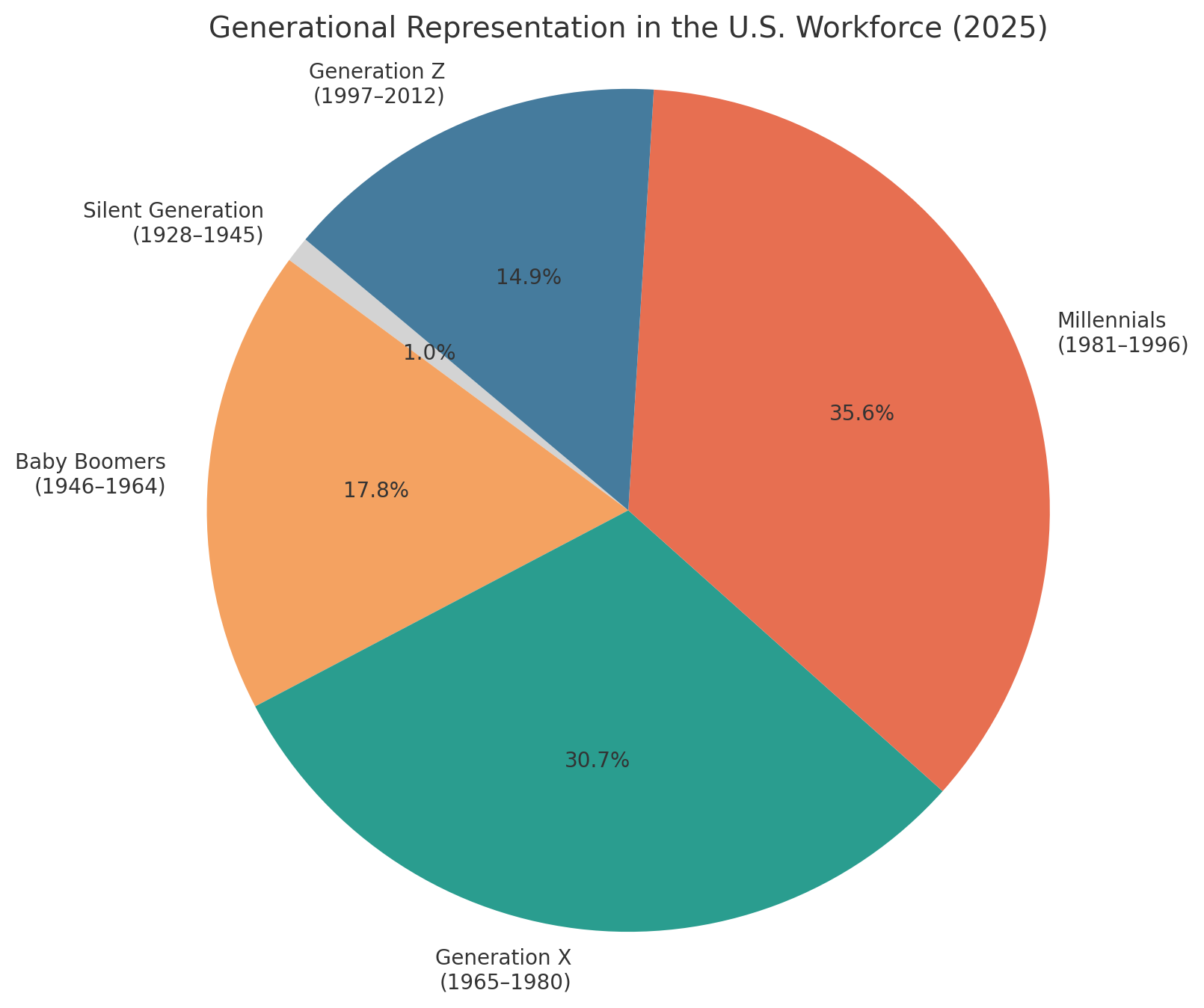With workplaces today getting more diverse than ever before, it has become quite normal to see people with these different views converge, connect, collaborate, and communicate in one location. Add to this a distinct personal branding, and you have a cauldron of emotions, worldviews, and decision-making styles colliding.
We now observe a fascinating dynamic: four or sometimes five generations are working side by side in many industries. Baby Boomers, Gen Xers, Millennials, and Gen Zers each come with their own set of values, communication styles, expectations, and definition of what success is.
While one group may value stability and loyalty, another thrives on flexibility and purpose-driven work. And even though these differences might lead to friction in the workplace, if understood and handled correctly, they can also create a powerful dynamic for fostering opportunities and mutual growth.
It's not just HRs now talking about generations in the workplace and the key differences between them. Executives who are leading generationally diverse teams should be able to balance their respective viewpoints and learn how to appreciate the strengths each generation has to offer. Whether it's mentorship, digital fluency, emotional intelligence, or a work ethic, each group has something unique to contribute.
Below, we will explore the characteristics, communication styles, and workplace preferences of each generation, as well as how organizations can foster unity amid diversity.
Bridging the Generation Gap in the Workplace
Workplaces today are uniquely diverse. Different generations are working side-by-side in the same office. Before we delve deeper into the nuances of each of the generations and what they bring (but also the challenges they face) in the workforce, let's understand what these generations are. They include:
Silent Generation (born between 1928–1945): most have retired. Those who remain active in the workforce constitute a tiny percentage.
Baby Boomers (1946–1964): they constitute roughly 18% of the U.S. workforce and bring decades of experience and institutional knowledge.
Generation X (1965–1980): 31% of the workforce, Gen Xers' distinctive features are their independence and adaptability.
Millennials (1981–1996): also sometimes called Gen Y, Millennials make up about 36% of the U.S. workforce. Marsh McLennan Agency
Generation Z (1997–2012): accounting for 15% of the workforce, Gen Zers are quickly surpassing Boomers as a significant presence, bringing fresh perspectives and digital fluency.
Generation Alpha (2013–onward): as of 2025, the oldest Gen Alpha representatives are 12 years old, so they are not yet relevant to the current generational workforce representation. However, future-thinking companies are already preparing for an influx of young employees in the next decades who are shaped by COVID-19, the AI revolution, climate change, and hybrid education.

Below, we will try to break down how each generation behaves in the workplace, their core values, and how to harness them to bring harmony and efficiency to the workplace. We will skip the Silent Generation and the Alphas on account of their minimal presence in the workplace. The other four we will review in detail to try and understand how to work together and build a strong and healthy work environment.
Baby Boomers

Baby Boomers grew up in the time of civil rights and women's movements, the assassinations of JFK and MLK, Watergate, and the Vietnam War. They are known as the Flower Children, becoming the generation that spent more than they saved. Not that saving mattered much since theirs was a time of prosperity when most people had two cars and plenty of disposable income.
At Work
Baby Boomers are hardworking and goal-oriented. They value teamwork and company loyalty above all. They are motivated by prestige, position, and perks. They are confident, self-reliant, and very opinionated, and enjoy confrontations. They entered the workforce at a time of significant expansion and change, and they always bring their competitiveness, outspokenness, and hardworking nature to the table.
Struggles
Baby Boomers tend to struggle with adapting to rapid technological changes or more casual work environments. They prefer structure and hierarchy, so digital communication, remote work, and a casual approach, so valued by Millennials and Gen Z, will clash with their work style. Boomers sometimes view younger generations as those lacking discipline, while they, in turn, might consider Boomers resistant to change or too authoritative.
How to Work Together
To create a workplace that actually delivers results, it might be best to position Baby Boomers in mentorship roles where they can share their institutional knowledge without feeling threatened by younger voices. Encouraging reverse mentoring - where Boomers learn new tech tools or trends from younger colleagues - can also strengthen mutual respect. Roles in strategic planning, client relations, or board-level decision-making suit Boomers well, as these leverage their experience, relationship-building skills, and big-picture thinking. Open communication, mutual recognition of strengths, and clearly defined goals are essential to bridging generational gaps and building stronger, multigenerational teams.
Generation X

Generation X currently accounts for both the largest generation in the workforce and the highest level of education in the US. This generation is shaped by the dot-com revolution, the AIDS epidemic, and the fall of the Berlin Wall. Many experienced dual-income households or were raised by single parents, leading to their reputation as the “latchkey generation” - independent, self-reliant, and skeptical of authority.
At Work
Gen Xers are hardworking and competitive, just like the generation that came before them. However, they don't see their lives dominated by their professions as Baby Boomers do. By nature, Gen Xers are individualistic, flexible, and consider work-life balance a top priority. Gen Xers work to live, not the other way around. However, that doesn't mean they're lazy. On the contrary, they work hard to ensure they savor the fruits of their labor. While they are known to inject humor and fun in the workplace, they know when to get serious and down to business.
Struggles
They represent one of the biggest percentages of the workforce in the US and are both tech-savvy and can foster meaningful personal connections. And yet, they tend to be overlooked for leadership roles - sandwiched between the ambitious Millennials and the experienced Baby Boomers. They also might be resistant to change if this means that they have to make sacrifices in their personal lives.
How to Work Together
Trust and autonomy are key to working well with Gen X, who appreciate direct and open communication and opportunities to solve problems independently. They value human connection and straightforward leadership. Giving them room to operate without micromanagement helps create a more engaged, loyal, and productive team environment.
Millennials

Perhaps the generation with the second-worst reputation, Millennials, before the arrival of Gen Z, have been unfairly vilified as lazy, self-entitled, and narcissistic. The truth is that Millennials work just as hard as the generations before them. Study after study has revealed that there's very little difference between Boomers, Gen Xers, and Millennials in terms of workplace attitudes. That said, much of the bad rep that this generation gets can be attributed to a lot of economic, environmental, and societal problems that they have faced, including the Columbine shooting, 9/11, student loan debt crisis, and an influx of cheap labor, among others. But despite these impactful issues, Millennials at work still manage to be motivated, innovative, and efficient.
At Work
Millennials grew up alongside technology, which means they are used to simplifying and optimizing work, so what some view as laziness is actually a more efficient way of getting the job done. They are also constantly looking for the next best thing, which can spur innovation and inventiveness - two qualities that are ideal to have for a company seeking growth. The best industries for Millennials include tech, education, nonprofit work, design, social impact, and entrepreneurship. Roles like web developer, UX designer, digital marketer, sustainability consultant, and social justice advocate align with both their skillsets and values.
Struggles
Millennials might have issues with authority structures, patience in hierarchical advancement, and handling criticism, especially when delivered outside context. They desire to do good and look for meaningful work, which can sometimes be misread as disloyalty or distraction.
How to Work Together
For Millennials to perform their best in the workplace, frequent, clear feedback should be offered, along with a clear path for career growth, flexible schedules, and a sense of purpose. They excel in environments that value collaboration, creativity, and digital agility.
Gen Z

They are the youngest and the newest generation entering the workforce. They're digital natives, self-reported smartphone addicts, raised with iPads and social media. Instant access to information is taken for granted. Unlike Millennials, who remember dial-up internet and a pre-digital world, Gen Z has never known a time without tech. They were heavily influenced and shaped by the Great Recession, climate change, and the pandemic.
At Work
Gen Z is a generation of a unique blend of pragmatism, resilience, and financial caution. Having experienced instability at a formative age, they value stability, transparency, and purpose-driven work. Like all generations before them, they want the room and want to be heard.
Gen Zers are practical, self-reliant, and yet highly collaborative when needed. They are eager to prove themselves and might be willing to work extra hours if it leads to advancement or personal growth. More than any other generation, they care about making an impact and expect the companies they work for to "walk the talk" when it comes to authenticity and inclusivity. Buzzword-filled "Mission and Vision" statements won't fool them.
Struggles
Gen Zers tend to be averse to risk and look for safety and stability more than any other generation before them. They prefer secure, well-defined roles over startup environments (unlike Gen Xers, who comprise some 55% of all startup founders!) or unpredictable career paths. They can also be plagued by bad decision-making affected by low confidence, fear of rejection, over-reliance on digital communication, weak interpersonal skills, and mental health issues (burnout and anxiety).
How to Work Together
Managers should focus on structure, transparency, and frequent feedback. Gen Zers prefer having clear career paths and ample learning opportunities. To help Gen Zers thrive at work, use mixed communication (including digital tools like Slack or Zoom and face-to-face), help them practice decision-making by giving them a voice, and build up their confidence through fair attribution of praise and clear milestones.
Xennials - the "Inbetweeners"
Xennials (born between 1977 and 1985) represent a generation of people who can't entirely relate to what came before and after them. They were the last generation to enjoy the widespread use of cassette tapes and landlines, and the first ones to grow up with household computers and the Internet. They didn't have cell phones until they were in their 20s. As the micro-generation that somehow doesn't fit anywhere, Xennials are identified as:
- Results-oriented
- Entrepreneurial
- Adept
First recognized as a completely distinct generation back in 2014, Xennials come with the best of both worlds, combining the work hard/play hard mentality of Gen Xers with the technological savvy of Millennials. As early users of all the new technologies available today, Xennials are flexible, adaptive, and great at multitasking.
Summary
Each of these generations has a different set of skills that they can bring to the workplace, which is often reflective of their personal values and characteristics. Employers and co-employees alike shouldn't see these different work attitudes as problematic. On the contrary, there are approaches that can help one exploit each generation's uniqueness and help get the most from their teams.
Which generation do you belong to? Do you agree with the assessments listed here about you and your peers? Do you find the observations about other generations on point? If you belong to a workforce hampered by generation gaps, getting individuals from each generation to support and train one another can be an effective way to bridge the gap between groups and form a more open line of communication. Learn to view the differences as strengths and draw from their good qualities.
If you're curious about your own workplace tendencies or would love a little clarity on how you operate best, you might enjoy taking a work personality or career aptitude test. Sites like Truity.com, 16personalities.com, and the official MBTI website offer insightful (and often free) tests that can help guide your personal development or job search journey.
And if you're working on landing that next big role or simply updating your resume for the ever-changing job market, please check out our professional resume writing services. Whether you're Gen Z just starting out or a Boomer looking to pivot, our experienced, certified resume writers are here to help you tell your career story in the most powerful way possible.
And remember this: your future and your career are NOT determined by when you were born.
People shift paths and rewrite their own stories every day. We should never discount reinvention, exploration, and growth, even when the economy is uncertain or when the career paths are not as straightforward as they once were. Keep learning, stay curious, and lean into your strengths – whatever your generation. You've got this!
